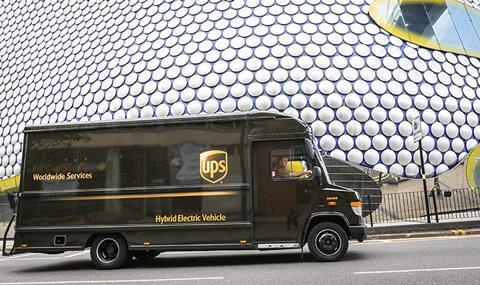
UPS has rolled out 15 range-extended electric vehicles (REEVs) in Birmingham and Southampton to overcome the range limitations it said pure electric delivery vehicles can face reaching depots or warehouses based outside the city centre.
“This is a big breakthrough for our continued use of electric vehicles in the UK – and for the communities we serve,” said Luke Wake, director of automotive engineering & advanced technology, UPS International.
“The range jump from 100km to 400km is the result of UPS’s latest collaboration with Tevva. We can serve our customers with lower emission, alternatively-fuelled vehicles in places beyond the reach of existing pure electric vehicles at this weight class.”
Developed in collaboration with Essex-based manufacturer Tevva Motors, the trucks use hybrid technology controlled by a geofencing system.
This enables the vehicle to switch to pure electric operation in inner city areas where the boundary of a clean air zone may start, for example, while back to range-extended mode on motorways where a small on-board diesel generator is used to charge the batteries.
The 23cu m carrying capacity of the trucks is the same as traditional diesel vehicles in the same weight class, enabling operators to reduce emissions without losing critical payload.
Its larger capacity can also prevent the need for multiple journeys by smaller zero-emission vehicles, said UPS, which helps tackle the issue of congestion in urban areas.
Read more:
- Tevva to offer range-extended truck on seven year full R&M lease deal
- UPS to trial 35 all-electric Arrival trucks in London and Paris
- UPS says new charging technology marks the beginning of the end for its diesel vehicles in London
“Commercial vehicles account for 27% of transport related CO2 and 5% of total greenhouse gas emissions on Europe’s roads. EU legislation says that this needs to be cut by 15% by 2025 and 30% by 2030, and Net Zero in the UK by 2050,” said Richard Lidstone-Scott, commercial director of Tevva Motors. “What that means is that the electrification of the medium duty truck sector is inevitable, yet many firms and OEMs are still scratching their heads about how and when to make that happen."
He added: “At Tevva we already have viable technology, proven in real-world trials, which can help companies like UPS reduce emissions to almost zero without compromising their business-critical ability to carry full payloads. What’s more, we’re already working on new technologies to make our solution more efficient still.”
The vehicles were part-funded by The Office for Low Emission Vehicles (OLEV) and Innovate UK and form part of UPS’s “rolling laboratory” strategy to develop a variety of alternative fuel vehicles for different applications.
- You can meet Tevva Motors at this year's Freight in the City Expo taking place on 6 November in London.













